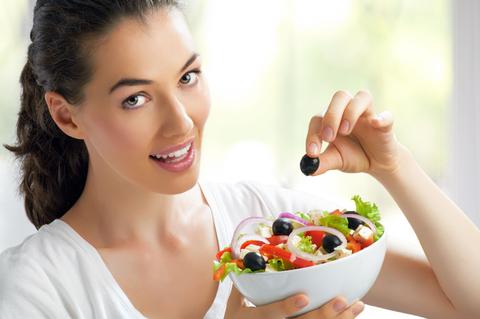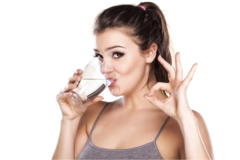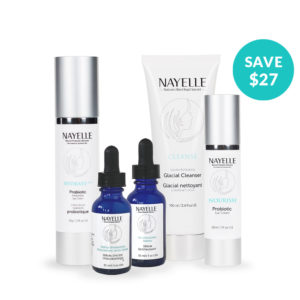
You are what you eat. Yes that is true. Beautiful skin starts with nourishment from within. The skin is the outer reflection of your inner health. Moist, clear, glowing skin is a sign of good diet, while dry, pale, scaly or oily skin may result when diet is not up to par. Fortunately, the eating habits that work best for staying healthy are also the next best thing to a fountain of youth for our skin.
So the better food you eat the better skin you will have.
Your skin needs a constant supply of water and oxygen. But that doesn’t mean standing in the air and taking a shower. Rather, these nutrients need to be supplied through blood. A healthy blood supply provides other nutrients as well and removes waste products. It takes an ample amount of many nutrients to build and maintain healthy red blood cells and other blood factors. Those nutrients include protein, iron and copper, plus folic acid, other B vitamins, and vitamins C and E. A deficiency of any of these, especially iron, reduces the oxygen-carrying capacity of the blood, suffocating the skin and leaving it pale and drawn.
“What is the connection between your stomach/gut and your skin?”
The GI tract and skin are both organs of detoxification. We need a healthy microbiome in the gut to break down food, absorb nutrients, and eliminate toxins. When our gut flora is not healthy, and there are more bad bacteria than good bacteria, a lot of problems can arise including chronic inflammation, which is a cause of acne and other skin problems. Some bad bacteria, fungus, and yeast can even cause inflammation in and of themselves. So, if you are looking to clear up your skin, you have to start with your gut.
Here are different types of vitamins and minerals that you can find in food that is essential to your skin’s beauty.
- VITAMIN C
- VITAMIN E
- VITAMIN D
- VITAMIN A
- WATER
- FAT
- OMEGA-3
- ZINC
- FOLIC ACID
- PROBIOTICS
- SELENIUM
VITAMIN C
Vitamin C helps build collagen, the “scaffolding” between the tissues of our body. Poor intake of this vitamin can cause bruising, loss of skin strength and elasticity, and poor healing of cuts and scrapes. Just one daily glass of orange juice or a bowl of strawberries supplies all the vitamin C you need.
- Peppers (Yellow Bell Peppers
- Guavas
- Dark Green Leafy Vegetables (Kale)
- Kiwifruit (Green)
- Broccoli
- Citrus Fruits (Oranges)
- Berries (Strawberries)
- Tomatoes (Cooked)
- Papaya
- Peas (Mange Tout)
VITAMIN E
Vitamin E is a fat-soluble antioxidant that is essential for the maintenance of healthy skin. Naturally occurring vitamin E is not a single compound; instead, vitamin E is a group of molecules with related structures, some of which may have unique properties in skin. Vitamin E is also conjugates that increase stability but require cellular metabolism for activation. It is normally provided to the skin through the sebum. Topical application can also supply the skin with vitamin E and may provide specific vitamin E forms that are not available from the diet. As an antioxidant, vitamin E primarily reacts with reactive oxygen species. In addition, vitamin E can also absorb the energy from ultraviolet (UV) light. Thus, it plays important roles in photoprotection, preventing UV-induced free radical damage to skin. Vitamin E may also have related anti-inflammatory roles in the skin. 
- Squash & Pumpkin
- Dark Leafy Greens (Cooked Spinach)
- Nuts (Almonds)
- Sunflower Seeds (Roasted)
- Avocados
- Shellfish (Shrimp)
- Plant Oils (Olive Oil)
- Fish (Rainbow Trout)
- Broccoli (Cooked)
- Fruits (Kiwifruit)
VITAMIN D
Vitamin D can be found in small amounts in a few foods, including fatty fish such as herring, mackerel, sardines and tuna. To make vitamin D more available, it is added to dairy products, juices, and cereals that are then said to be “fortified with vitamin D.” But most vitamin D – 80% to 90% of what the body gets – is obtained through exposure to sunlight.
Some people use vitamin D for skin conditions including vitiligo, scleroderma, psoriasis, actinic keratosis, and lupus vulgaris. Vitamin D in milk might help curb symptoms of psoriasis
- Orange Juice
- Soy Milk
- Cereals
- Fatty Fish
- Tuna
- Mackerel
- Salmon
- Cheese
- Egg Yolks
- Beef Liver
WATER
Water keeps the skin moist and regulates normal function of the oil glands. The list of nutrients that benefit the skin is almost endless. It is an essential component for the effective functioning of our body. Approximately 50 to 70% of our body mass is made up of water, including skin, tissues, cells and the organs.
Water staves off dehydration. Dehydration is a condition in which the body doesn’t have enough water to support the vital functions. It removes toxins and waste products from the body thereby cleansing it.

Water is required to process all the nutrients from the food we eat and carry the assimilated nutrients to the cells by circulating through the lymphatic system. Lack of water in the body can cause constipation, asthma, allergy, hypertension, migraine and many other health problems.
Water is essential to maintain the optimum skin moisture and deliver essential nutrients to the skin cells. It replenishes the skin tissue and increases its elasticity. This helps delay the appearance of signs of ageing like wrinkles and fine lines.
OMEGA-3
The most important of these fats are omega-3, not only as they form part of the structure but also because they have anti-inflammatory properties, unlike omega-6 fats that can actually cause inflammation.
They are found in vegetable and seed oils. Traditionally these have been used in home cooking as well as in processed foods.
High levels of omega-3 have been shown to plump up the look of the skin as well as the quality, by reducing inflammation as well as supplying the building blocks for healthy skin cells. In addition, omega-3 suppresses a hormone produced by the liver called insulin-like growth factor 1 (IGF-1), which can in turn reduce spots and blemishes
- Mackerel
- Cod Liver Oil
- Salmon Fish Oil
- Chia Seeds
- Walnuts
- Herring
- White Fish
- Sardines
- Hemp Seeds
- Anchovies
- Egg Yolks
PROBIOTICS
Scientists are just beginning to unlock why and how probiotics, the “good” bacteria that live in your gut and aid digestion, can boost your health. Probiotics help keep an essential balance of flora in our digestive system. Research suggests they are responsible for a variety of benefits including supporting the immune system, relieving depression and helping to prevent obesity. You’ve probably seen probiotics in capsule or powder form, but you can also find this friendly bacteria in many foods you might already be eating. They also may help tame gas, diarrhea, and other digestive problems. Food has an almost immediate effect on your intestinal environment, which is composed of trillions of microbes. But the jury’s still out concerning how often and in what quantities you’d need to consume certain probiotics to reap the benefits.
- Yogurt
- Dark Chocolate
- Sauerkraut
- Kefir
- Miso Soup
- Pickles
- Tempeh
- Kimchi
- Kombucha Tea
It’s amazing how NAYELLE’s skin care line that contains all natural ingredients enriched with Probiotic Technology can give us different options to choose from. Feel beauty from within and this will be the answer to your undying skin problem.

